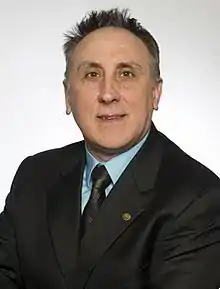Carlos Lousto
Carlos O. Lousto is a Professor in the School of Mathematical Sciences in Rochester Institute of Technology, known for his work on black hole collisions.
Carlos Lousto | |
|---|---|
 | |
| Born | Carlos O. Lousto Buenos Aires, Argentina |
| Occupation | Professor of Mathematical Sciences (SMS) and Astrophysical Sciences and Technology (AST), Rochester Institute of Technology (RIT) |
| Education | Ph.D: Astronomy, National University of La Plata Physics, University of Buenos Aires |
Professional career[1]
Lousto is a professor in the RIT's School of Mathematical Sciences and co-director of the Center for Computational Relativity and Gravitation. He holds two PhDs, one in Astronomy (studying accretion disks around black holes and the structure of neutron stars) from the National University of La Plata, and one in Physics from the University of Buenos Aires (on Quantum Field Theory in curved spacetimes), received in 1987 and 1992.[2]
Carlos Lousto has an extensive research experience which ranges from observational astronomy to black hole perturbation theory and numerical relativity to string theory and quantum gravity. He has authored and co-authored over 150 papers [3] , including several reviews and book chapters. His research is funded by NSF and NASA grants and supercomputing allocations in national labs.
Lousto is a key author of the breakthrough on binary black hole simulations and his research discovered that supermassive black holes can be ejected from most galaxies at speeds of up to 5000 km/s. He recently performed challenging simulations of small mass ratio black hole binaries up to 100:1 and at separations up to 100M and for flip-flopping black holes. Lousto has designed the Funes (UTB), NewHorizon, BlueSky, and GreenPrairies (RIT) supercomputer clusters to perform binary black hole simulations and used them to support the first detection of gravitational waves from the merger of two black holes.[4]
Distinctions
In 1991, Carlos Lousto was honored with an Alexander von Humboldt Foundation fellowship.
In 2006 and in 2016 his research was acknowledged in the US congressional records.
In 2012, Carlos Lousto was elected a Fellow of the American Physical Society "For his important contributions at the interface between perturbation theory and numerical relativity and in understanding how to simulate binary black holes".
2016 Special Breakthrough Prize in Fundamental Physics "For the observation of gravitational waves, opening new horizons in astronomy and physics".
2019 Edward A. Bouchet Award Recipient "For contributions to both numerical relativity, conducive to the solution of the binary black hole problem, and the understanding of the first detection of gravitational waves and service to the Hispanic scientific community, including the establishment of the Center for Gravitational Wave Astronomy, the University of Texas at Brownsville in 2003".
Selected bibliography
Highlights per year:[5]
1997 Exact self-consistent solution to semiclassical gravity. Published in Phys. Rev. D 56, 3471
2000 First explicit computation of Self-Force. Published in Phys.Rev.Lett. 84 (2000) 5251-5254
2001 First waveform of BBHs with Lazarus. Published in Phys.Rev.Lett. 87 (2001) 121103
2005 Breakthrough in Numerical Relativity for evolving BBHs. Published in Phys.Rev.Lett. 96 (2006) 111101
2006 The hangup effect in BBHs. Published in Phys.Rev. D74 (2006) 041501
2007 The large recoils in BBHs. Published in Astrophys.J. 659 (2007) L5-L8. Published in Phys. Rev. Lett. 98, 23110
2010 Evolution of 100:1 mass ratio black hole binaries. Published in Phys. Rev. Lett. 106, 041101
2011 The 5000 km/s recoils. Published in Phys.Rev.Lett. 107 (2011) 231102
2015 Flip-Flops. Published in Phys.Rev.Lett. 114 (2015) 141101
2016 Observation of gravitational waves from a binary black hole merger. Published in Phys.Rev.Lett. 116 (2016) 061102
References
- "CCRG". Archived from the original on 2016-06-03. Retrieved 2016-06-01.
- "Carlos Lousto". Rochester Institute of Technology. Retrieved June 7, 2016.
- "Google Scholar".
- The Huffington Post
- InSPIRE
External links
- (in Spanish) Radio Interview
- (in Spanish) TV interview, P1,TV interview, P2